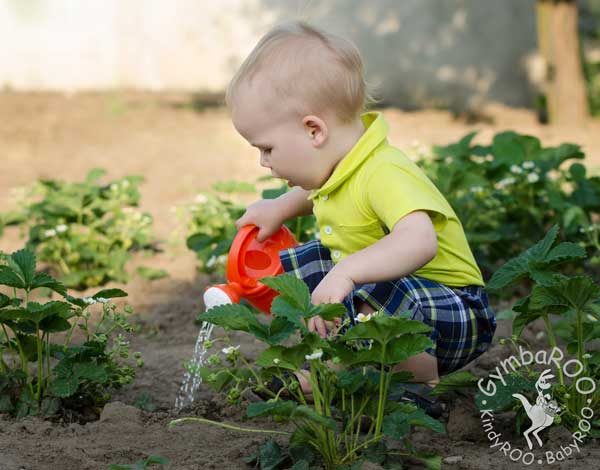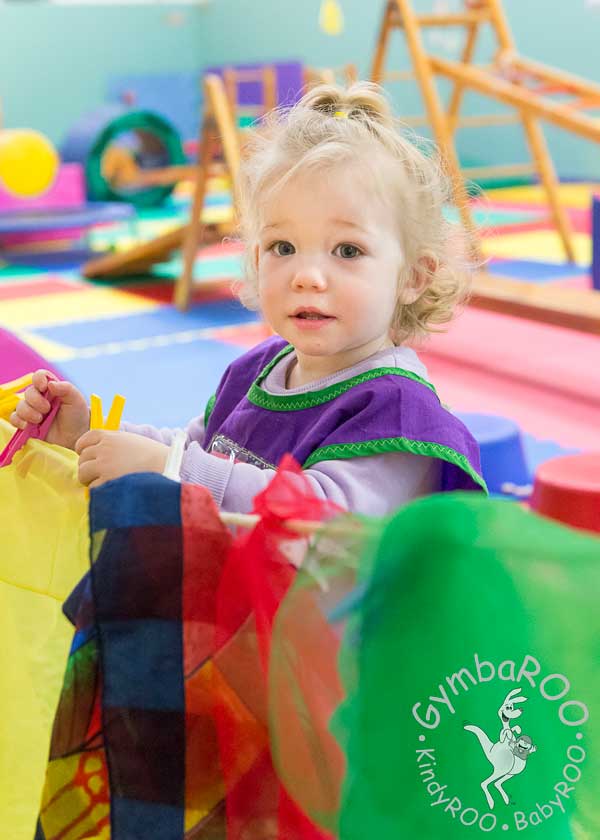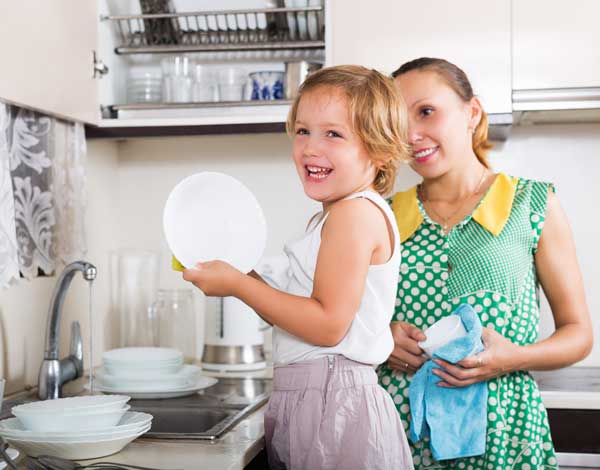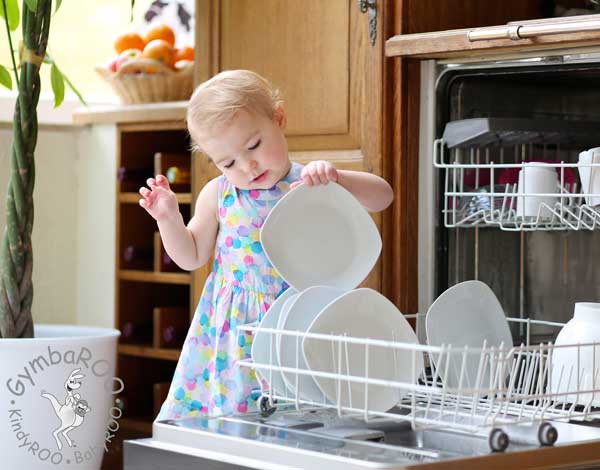Join the thousands of parents already raising smarter, happier babies with our online baby classes: The Active Babies Smart Kids series. Click here.
GymbaROO-KindyROO kids are excelling academically, emotionally, in leadership roles and on the sporting field. Find us at: GymbaROO-KindyROO
Raising happy, secure and responsible children within a loving family environment is every parent’s goal. But when the pressures of daily life make our homes more frenzied than friendly, we wonder what we can do to make things better. A good place to start is to look at household ‘jobs’ that keep families organised and functioning smoothly. Engaging young children in taking on daily responsibilities is not only a key to happy families, but even more importantly their tasks help enhance their brain development and prepare them for future competencies. See our article: Chores make kids smarter, happier and more successful.
The best way to go about it is to work within children’s developmental stages and to capture their natural, intrinsic drive to be active, productive and creative contributors to the family. We need to keep in mind what is appropriate for their age. We should however, never underestimate children’s ability and desire to help around the house. It’s never too early to begin giving children chores, even if it’s just picking up the toys after they have learnt to walk. Starting with some simple tasks between the ages of two to three will help the children adjust to higher expectations and increase responsibilities, as they get older.
What chores when?
One year olds
At the age of eighteen months children are fascinated with household, gardening and garage objects. They love to imitate simple, everyday activities such as feeding the cat, sweeping, washing clothes and gardening. When toddlers ask to help fold laundry or wash the car with us, it may be easier to send them off to play so we can get the job done ourselves, but this is exactly the time to foster a child’s natural desire of helpfulness. At this stage of development, children like to be near familiar adults or older siblings and do things together. As they enjoy putting objects in and out of containers, it’s the best time to engage them in helping to pack up their toys, throw away rubbish and carry their dirty clothes to the washing basket.
Two year olds
Between the age of two and three, children become intensely curious about their environment and watch others with great interest. They like to follow parents around the house imitating household chores. At this age, they have become exceedingly active and like to be engaged in activities that are physical, such as dressing and undressing themselves, washing the kitchen floor, carry dishes to the sink, helping to water plants and dust chair seats, coffee tables or window sills. They clamour to be included. They not only want to play with some cooking toys they want to participate in the real work that’s taking place. It’s a good idea to let them cut fresh mushrooms with a butter knife, so they recognise their contribution towards dinner.
Three year olds
At the age of three, children appreciate the size and movements of their bodies in relation to external objects and space. They naturally beg to help with chores while asking many questions such as “What are you doing on the veranda?” “Where are you going to put this screw?” “Who is coming to dinner?” Matching objects and counting becomes one of their favourite activities. What better way to capture their interest and involve them in conversation while encouraging them to pull weeds out of pots on the veranda, peg clothes on the line, put toys away in designated places, straighten up books, fold small laundry items, match up their socks, count out the spoons or help to pump up a tyre on their tricycle.

By enabling them to help with chores, we are demonstrating to them that jobs are always easier when we make it enjoyable, manageable and when we do it together. Families are all about support and togetherness and when everyone pitches in with chores, it reinforces that message. It also provides us with the opportunity to give appropriate guidance with the skills involved and to break the job down into several easy steps, as well as giving lots of positive feedback and praise. Expressing appreciation by doing something fun after the jobs are done shows children that doing chores benefits everyone. Using the phrase “after the job is done” regularly helps them to learn that doing their chores is the way to have more time for fun.
Four year olds
Four year olds show increasing skill in body control and in handling objects, are able to wash and dry hands, brush teeth, dress and undress and try to do things more independently. They can be strong self-willed, but show a sense of humour in talk and activities. They are constructive out-of-door builders with any materials available. All children love companionship with whom they are alternately cooperative and aggressive, as with adults, but understand to argue with words rather than blows. They show concern for younger siblings and playmates. Tasks for this age group need to include taking more responsibilities for personal care and clothing and engaging them in help with younger siblings. This age group can set and wipe the table, assist in unloading the dishwasher, help make their bed, empty small rubbish bins and replace liners, peg clothes on the line sequencing the pegs by colour (e.g. red, green, yellow then blue; repeat), feed a pet and help with small jobs in the garden. This age group responds best to humorous encouragement and praise, as well as playing some happy music or singing while doing their jobs.
Five year olds
By the age of five children can grip strongly with either hand, manipulate large and minute objects and follow four to six instructions. Their behaviour is more sensible, controlled, independent and cooperative. They understand the need for order and tidiness, but still need constant encouragement. They appreciate the meaning of time in relation to their daily program. Tenderness and protectiveness is shown towards younger children and pets. This age group can be involved in making up a visual chart for jobs and agree on doing certain tasks in a routine way e.g. tasks before and after kindergarten. The children can be asked to straighten their bed, sort and fold clothes, empty and fill the dishwasher or wash non-breakable dishes at the sink, put away laundry, tidy their room, gather food for lunch boxes, empty lunchboxes. Make a simple breakfast or snack, carry and pack away some shopping, do some weeding and raking up leaves. Children at this age enjoy the challenge of beating a timer to complete their task. They love making up humorous rhymes about what they are doing.

Read now: Chores make kids smarter, happier and more successful.
Marianne Schriever is a past School Principal and neuro-educational consultant for GymbaROO/KindyROO
GymbaROO Image by Studio Z Photography
References: Mary Sheridan – From Birth to Five Years. Dr Martin Rossman – Involving Children in Household tasks: Is it worth the effort? Published by University of Minnesota. Frank R. Wilson – The Hand: How its use shapes the brain, language and human culture.
GymbaROO-KindyROO
Thousands of parents, babies and children are presently involved in our programs and creating rising stars. GymbaROO-KindyROO kids are excelling academically, emotionally, in leadership roles and on the sporting field. Come join all the fun and learning! “GymbaROO – The best decision I ever made for my child.” Classes from 6 weeks old – 7 years GymbaROO KindyROO
Active Babies Smart Kids – Online Baby Classes
GymbaROO-KindyROO’s online series of baby classes is taking the parenting world by storm! It is highly recommended by doctors, paediatricians, early childhood experts and the Maternal Child and Family Health Nurses Association. This series is being called: “The essential guide for parents”. Join the thousands of parents already playing with their babies from birth, in the best way for brain and body development and laying crucial foundations for future learning. What happens in the first year, not only matters, it matters a lot! Enjoy the introductory video below.
Click here: Active Babies Smart Kids online series of baby classes
Try the first episode FREE: Tummy time + baby fun and development class 1
Enjoy the following GymbaROO-KindyROO articles
GymbaROO-KindyROO: Who, what, where, why and how
All about GymbaROO-KindyROO’s online baby classes for parents and babies: Active Babies Smart Kids
How to raise a smarter, happier baby
Help children develop healthy eating habits from the start.
Cooking with your toddler – So many learning opportunities.
Happy for life: How GymbaROO helps emotional development.
Storytelling – More than just telling a story.
How and why to encourage your child to be a STEM thinker.
Kids learning ability jumps 2 years with 25 minute GymbaROO movement program 3x a week.
Why every young child needs a trapeze and how to make one.
NAPLAN results improve with LESS reading and maths and MORE GymbaROO.
To my elected childcare, preschool or school: Please include a GymbaROO sensorimotor program.
GymbaROO / BabyROO: What parents say.

